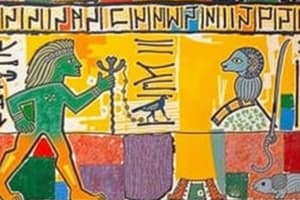Podcast
Questions and Answers
Where did the Sumerians establish one of the earliest urbanized settlements?
Where did the Sumerians establish one of the earliest urbanized settlements?
- On the Arabian Peninsula
- In the Indus River Valley
- Along the fertile banks of the Euphrates and Tigris rivers (correct)
- Near the Mediterranean Sea
Which city was built by the Babylonians and housed iconic structures like the Hanging Gardens?
Which city was built by the Babylonians and housed iconic structures like the Hanging Gardens?
- Ur
- Nineveh
- Babylon (correct)
- Thebes
Which ancient civilization was known for their architectural prowess displayed in the pyramids of Giza?
Which ancient civilization was known for their architectural prowess displayed in the pyramids of Giza?
- China
- India
- Greece
- Egypt (correct)
What form of writing did the Sumerians introduce around 3000 BCE?
What form of writing did the Sumerians introduce around 3000 BCE?
Which civilization developed systematic methods for measuring time and stars in mathematics and astronomy?
Which civilization developed systematic methods for measuring time and stars in mathematics and astronomy?
Which river valley was home to pharaonic Egypt, a civilization dating back over 5,000 years?
Which river valley was home to pharaonic Egypt, a civilization dating back over 5,000 years?
What characterized the Indus Valley Civilization's system?
What characterized the Indus Valley Civilization's system?
Which of the following ancient civilizations emphasized democracy and produced great thinkers like Plato and Aristotle?
Which of the following ancient civilizations emphasized democracy and produced great thinkers like Plato and Aristotle?
What ancient civilization is renowned for elaborate engineering feats such as aqueducts, bridges, and the Colosseum?
What ancient civilization is renowned for elaborate engineering feats such as aqueducts, bridges, and the Colosseum?
Which ancient civilization had writing scripts that are still undecipherable today?
Which ancient civilization had writing scripts that are still undecipherable today?
Which ancient civilization interacted with others, exchanging ideas, resources, and knowledge?
Which ancient civilization interacted with others, exchanging ideas, resources, and knowledge?
What aspect distinguished Rome as a Mediterranean superpower?
What aspect distinguished Rome as a Mediterranean superpower?
Flashcards are hidden until you start studying
Study Notes
Unraveling History's Tapestry: A Glimpse into Ancient Civilizations
Throughout human history, exceptional societies have emerged with unique cultural identities, advancements, and challenges. In this exploration of our past, we will delve into some of the most celebrated civilizations that shaped humanity during antiquity—the era spanning from the first cities around 3500 BCE until the fall of the Western Roman Empire in 476 CE.
Sumerians and Babylonians
The Sumerians established one of the earliest urbanized settlements in Mesopotamia along the fertile banks of the Euphrates and Tigris rivers, introducing cuneiform writing circa 3000 BCE. Their successors, the Babylonians, built the city of Babylon, which housed iconic structures like the Hanging Gardens of Babylon and the Tower of Babel, immortalizing them through Greek historian Herodotus' writings. The Babylonian kings contributed greatly to mathematics and astronomy by developing systematic methods for measuring time and stars.
Egypt
In Africa, pharaonic Egypt flourished alongside the Nile River valley, its civilization reaching back more than 5,000 years. The pyramids of Giza serve as enduring testaments to their architectural prowess, while Egypt was also home to vast religious systems personified by deities such as Osiris, Isis, Horus, and Anubis. Egyptian hieroglyphics represent another significant achievement, providing insight into daily life and religious beliefs.
Indus Valley Civilization
India boasts one of the world's oldest civilizations, dating back to around 2800–1900 BCE. Its roots trace back to the Indus Valley region, where towns such as Mohenjo-Daro and Harappa thrived under a well-organized system centered around trade, infrastructure, and sanitation—a stark contrast to contemporary conditions elsewhere in the Bronze Age. Archaeological evidence suggests the existence of writing scripts yet undecipherable today; however, indications of social hierarchy and robust economic networks can still be observed.
Classical Greece
Greek society has left indelible marks on philosophy, science, art, and politics across centuries. Athens, in particular, embodied the spirit of democracy and produced great thinkers like Plato, Aristotle, Thucydides, Homer, Sophocles, and many others whose works continue to influence culture globally.
Rome
No discussion of ancient civilizations would be complete without mentioning the Romans, who rose to prominence following the collapse of Carthage after two Punic Wars against Hannibal Barca. This Mediterranean superpower offered much to modern society, including elaborate engineering feats such as aqueducts, bridges, roads, and monuments like the Colosseum and Pantheon.
As you peruse these remarkable epochs in human history, remember that each story is interwoven within the fabric of the global narrative. These civilizations did not exist independently; instead, they interacted, exchanging ideas, resources, and knowledge, often influencing future developments. And so it remains in our collective quest to comprehend the complexity of our shared heritage.
Studying That Suits You
Use AI to generate personalized quizzes and flashcards to suit your learning preferences.




